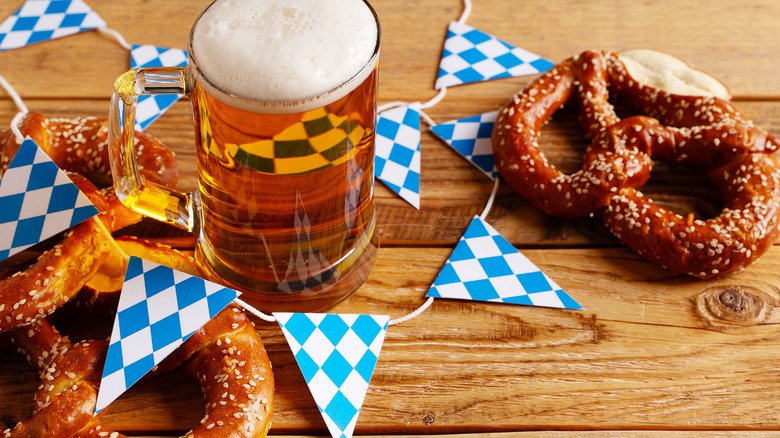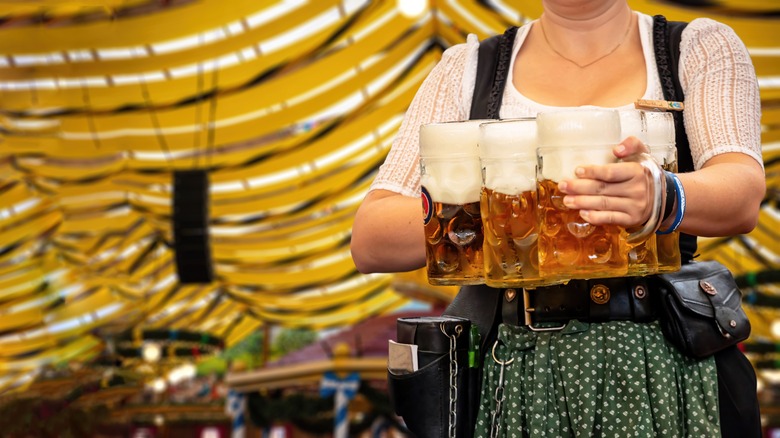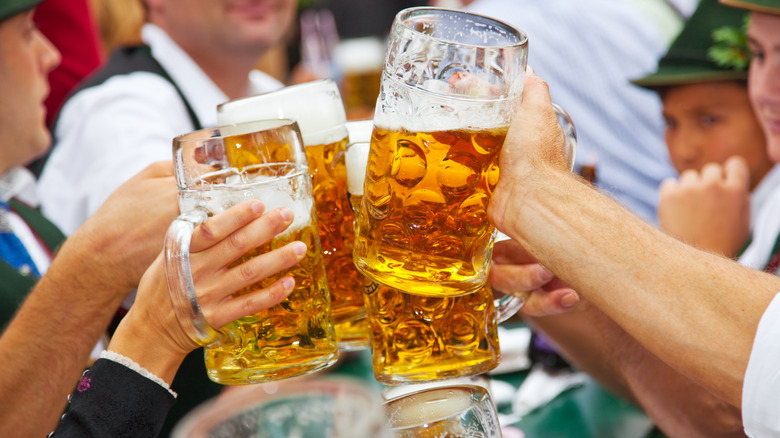The Origins Of Oktoberfest (And Why It Starts In September)
Each year, in late September and early October, millions gather in beer halls around the world to partake in the tradition of Oktoberfest. For many, the event marks the beginning of fall and serves as the perfect excuse to enjoy a nice cold stein of lager. The exact dates of Oktoberfest vary, but the event runs from the third Saturday in September through the first Sunday in October, with a few exceptions.
The tradition is an iconic celebration of German culture that brings millions of attendees to beer halls and tents across Munich (and the world). But have you ever wondered where the tradition of Oktoberfest originated? The event that we now know as the beloved tradition of Oktoberfest has some unexpected (and royal) origins. The event that kicked off what would become Oktoberfest was held in 1810 in Munich, the city that still serves as host to the massive celebration. The festival was held in mid-October to celebrate the marriage between the Bavarian prince Ludwig I and Princess Therese, according to the Oktoberfest website. The festival was originally set to be a one-time celebration and included many activities, including horse racing, which is still a popular Oktoberfest event. The wedding celebration was such a hit that it soon became an annual event.
But why is Oktoberfest held mostly in September? After all, it seems counterintuitive for a festival named for October to take place mostly in September. The initial Oktoberfest celebrations were, in fact, held in the middle of October. However, by the 1890s the event was moved to September. The shift in festival dates was due to September's milder, more festival-friendly weather, as well as its longer daylight hours.
A festival that takes beer very, very seriously
Regardless of its royal origins, Oktoberfest has become synonymous with one thing: beer. And this is for good reason. Beer in Germany is taken very seriously. And Oktoberfest brings that stringency to new levels entirely. Beer produced in Germany is subjected to purification laws known as Reinheitsgebot, according to NPR. Reinheitsgebot is an over 500-year-old law, one of the oldest food safety laws to be in continuing practice. The practice originated in 1516 in Bavaria, and set strict guidelines for beer production, limiting ingredients allowed in beer to malt, hops, and water.
In Munich, beer is the centerpiece of all Oktoberfest celebrations. During Munich's massive Oktoberfest celebrations, only beer produced within Munich is allowed to be served. The beers served during Oktoberfest in Munich are usually lagers that are light in color. However, in the United States, amber-colored Marzen lagers are favored, a move that harkens back to early celebrations of Oktoberfest in the 1800s when Marzen beers were also served. Regardless of which style of beer you partake in, however, Oktoberfest is the perfect opportunity to explore the intricate world of German beer craft.
A global celebration with local flare
Since the original 1810 wedding celebration, Oktoberfest has evolved into becoming a global celebration. And in the United States, Oktoberfest has become a staple of many communities. Many American towns hoping to embrace their German heritage use the celebrations to showcase the best of what Germany has to offer. Places like the Bavarian-themed town of Helen, Georgia, for example, hold a popular Oktoberfest celebration each year. The mountain town, which resembles a small Bavarian village, brings in many visitors hoping to capture the magic of a Bavarian beer hall right in the heart of the South.
Meanwhile, Cincinnati, Ohio, unofficially renames itself as Zinzinnati each autumn for its Oktoberfest celebrations. Each year, hundreds of thousands of visitors flock to the city for steins of beer, soft pretzels, and sausages. Of course, the sausages of Zinzinnati aren't limited to the food variety. The city also holds a "Running of the Wieners" competition each year, during which 100 dachshunds dressed as hotdogs compete for the title of fastest wiener. Of course, there are many many cities that could sport the title of best Oktoberfest.
Regardless of how or where you celebrate Oktoberfest, it can be the perfect opportunity to explore the best food and beer that Germany has to offer. And if beer isn't your thing, there is a whole world of German food in which to indulge.


